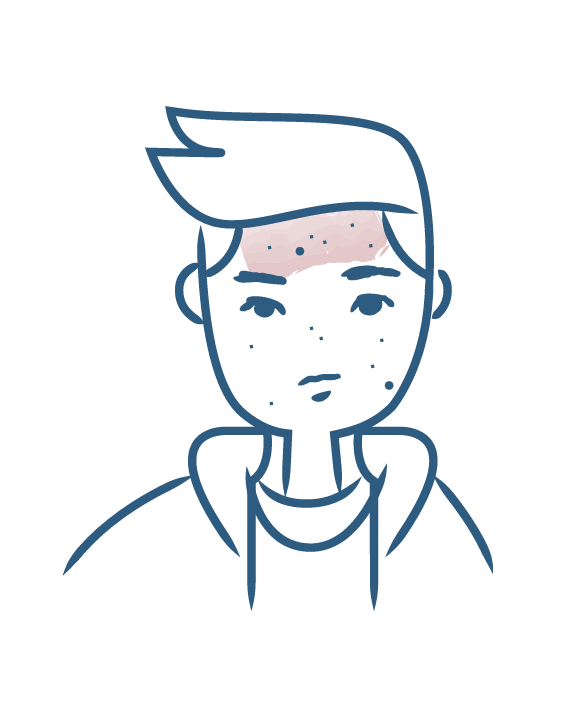
What is the right acne treatment?
Acne treatments vary and may be adapted to all forms of acne, from the mildest to the most severe. More often than not, a person suffering from acne will try several treatments before finding one that works for them. Some will work well, others much less or not at all. But before concluding that the treatment has failed, you should be aware that all acne treatments must be used every day for several weeks or months before any results can be expected. You must rigorously and regularly apply your acne treatment to ensure it is as effective as possible!
"Every person is unique."
Acne treatments are prescribed based on age, but also the extent and severity of the lesions. The treatment of juvenile acne for your eldest child should not be applied to a spot flare-up in your youngest! Infant acne is a very specific form of the condition, the management of which is essentially based on cleansing care while adult acne often has a major impact on quality of life, affecting relationships with colleagues, friends and partners. First, a possible cause (drug, cosmetic, hormonal-related) must be sought, followed by the start of customized adult acne treatment. In all cases, acne treatments vary in efficacy from one person and period to another. Avoid comparing yourself with your classmate or the person next door!
"I'm going to see a doctor."
If you have acne, we strongly recommend seeing a doctor. Your general practitioner (GP) is often the first doctor to be seen if you have acne. They will make a diagnosis, prescribing your first acne treatments. A dermatologist, on the other hand, is a skin specialist and works on different treatment stages. They can perform specific treatments such as skin cleansing, skin peels or even laser treatment. You are strongly advised to ask any questions you may have during the consultation, as well as telling the doctor about your acne history, any family-related acne history and any treatments that you’ve already tried.
"I use acne cream."
Many acne creams are available over-the-counter in pharmacies and parapharmacies. They help to fight effectively against oily skin, spots and residual marks. These creams can be used alone or in combination with medication. In general, acne creams are applied to the entire area to be treated (face and/or body) except for targeted treatments such as "anti-spot" products which are applied spot by spot to treat and/or camouflage them.
"I'm taking acne medication."
When creams are no longer effective, how do you treat acne? Acne medications are usually prescribed by your doctor. These are topical medicinal treatments, in the form of a cream or gel, or medication taken orally. While it may seem a little strange to treat a skin condition "from the inside out", it really works! Some antibiotics, isotretinoin and zinc, have proven effective in the oral treatment of acne. Local cream-based treatments are often maintained over a long period, except for isotretinoin: this acne treatment has the disadvantage of irritating and drying out the skin. Throughout the treatment process, the patient must apply specific hydrating and soothing compensatory care procedures.
"I'm getting laser treatment for my acne."
Laser technology is increasingly offered by dermatologists for a variety of skin conditions, including acne. There are several ways of administering laser treatment for acne, including fighting a particularly inflammatory flare-up of spots, excess sebum or acne scars.
"I’m doing all I can to take care of my skin."
Regardless of the treatment envisaged, acne management is all about simple steps and common sense. Hygiene is key for optimizing efficacy and tolerance for all acne treatments. The sun is a danger to acne-prone skin and should be avoided, while cosmetic products and makeup should be non-comedogenic. Eat a balanced diet, drink plenty of water, get enough sleep, undertake regular physical activity and do your best to keep stress to a minimum.
Our care routines
Oily or acne-prone skin
- Discover Anti-blemish face care summer routine for adult skin
Anti-blemish face care summer routine for adult skin

